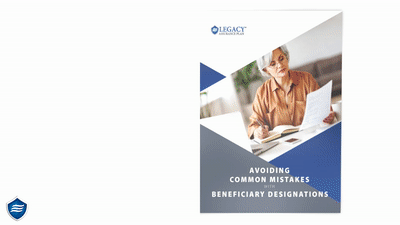Estate planning is a vital aspect of financial management for couples, playing a crucial role that extends beyond the mere allocation of assets. It serves as a fundamental tool in preparing for the unpredictability of life, including the eventuality of one partner predeceasing the other. The potential of widowhood, often an overlooked aspect, is an essential consideration in this planning process.
The importance of safeguarding the financial future of the surviving spouse cannot be overstated. When one partner passes away, the impact extends beyond the emotional and personal loss; it also brings about significant financial changes. Without a well-thought-out estate plan, the surviving spouse could find themselves in a precarious financial position, facing challenges such as loss of income, access to funds or even the family home. This scenario can be particularly distressing during a period of grief and adjustment.
Effective estate planning addresses these concerns proactively. It involves not just the distribution of assets, but also the careful consideration of various financial instruments and legal structures that can provide ongoing financial support and stability for the surviving spouse. This includes mechanisms like life insurance policies, trusts and clear directives regarding retirement funds and other investments.
In addition, estate planning offers an opportunity for couples to make joint decisions about their financial future, ensuring that both partners’ wishes are respected and fulfilled. It allows couples to discuss and plan for scenarios where one partner may not be present, thus ensuring that the survivor is not burdened with making critical financial decisions during a time of grief.
A well-structured estate plan ensures that assets are transferred smoothly and taxes are minimized, preserving the assets built together by the couple for the surviving partner’s benefit. It also provides clarity and direction for handling debts, ongoing expenses and other financial obligations, thus helping to protect the surviving spouse from potential legal and financial complications.
In essence, a comprehensive estate plan is a manifestation of care and foresight. It reflects the couple’s mutual desire to protect and provide for each other, regardless of life’s unforeseen events. By addressing the possibility of widowhood in their estate planning, couples can ensure that the surviving spouse is not only secure in their financial future but also equipped to move forward with confidence and peace of mind.
Impact of widowhood on estate plans

The onset of widowhood brings a profound shift in the landscape of estate planning. This life event not only marks an emotional transition but also results in significant changes in financial and legal affairs. The active involvement of both partners in estate planning is crucial in preparing for such a scenario. It's about more than just preparing for the inevitable; it's about crafting a strategy that protects the surviving spouse from potential financial hardships.
One of the key aspects of this joint planning process is the mutual understanding of each partner's wishes. This understanding forms the foundation of an estate plan that truly reflects the couple's collective desires and objectives. It involves open and honest communication about a range of sensitive topics, including the distribution of assets, care directives and even funeral arrangements. This conversation ensures that the surviving spouse is fully aware of their partner's intentions and prepared to execute them when the time comes.
Joint assets, often a significant part of a couple’s estate, require careful consideration in this planning process. Decisions about the family home, shared investments and joint bank accounts must be made with an understanding of the legal and tax implications of transferring these assets upon the death of one partner. This includes understanding how these assets are titled, as this can greatly affect the ease with which they are transferred, and whether they will be subject to probate or other legal processes.
Each decision within the estate plan needs to be made with an eye toward its future implications. For instance, if one partner is significantly reliant on the other for financial support, arrangements such as life insurance, annuities or trusts can be crucial in ensuring ongoing financial stability. Additionally, considerations about managing any outstanding debts, maintaining the lifestyle of the surviving spouse and even planning for long-term care need to be factored into the estate plan.
The ultimate aim of such thorough planning is to create a seamless transition for the surviving spouse. This transition is not just about transferring assets; it’s about providing a sense of security and continuity in a time of upheaval. A well-crafted estate plan can alleviate the financial pressures that often accompany widowhood, allowing the surviving spouse to focus on coping with their loss without the added burden of financial worries.
In essence, when both partners are engaged in the estate planning process, they lay the groundwork for preserving their shared legacy and ensuring that the surviving spouse is cared for according to their joint vision. This collaborative approach is a powerful way to honor the life they built together and to provide peace of mind for the future.
Updating wills and trusts

The loss of a spouse may necessitate changes in beneficiaries, executors and trustees, along with adjustments in how assets are distributed. In the absence of these updates, your estate could be subjected to unintended distributions or legal complications, potentially placing your assets in probate or in hands you hadn’t intended.
Regularly revisiting your estate planning documents ensures they remain aligned with your current life situation and preferences. An effective approach to keeping these documents relevant includes conducting annual reviews. This routine check provides an opportunity to reflect on any major life changes over the past year and assess whether these changes warrant modifications in your estate plans.
Consulting with an estate planning attorney is another crucial aspect of effective updating. Legal professionals specializing in estate planning can offer invaluable guidance on the latest laws and regulations, ensuring your estate documents are not only updated but also legally sound and effective. They can help navigate complex scenarios, such as remarriage, blended families or changes in financial status, ensuring that your estate plan reflects these factors.
Additionally, it’s important to ensure that all your estate documents are in sync with your current life situation. This includes not just your will and trusts, but also other relevant documents like life insurance policies, retirement accounts and powers of attorney. Consistency across these documents is key to a cohesive and effective estate plan.
Estate planning documents should evolve alongside your life’s journey. Regular reviews, professional legal consultation and a holistic approach to updating these documents can ensure that your estate plan accurately reflects your current wishes and circumstances, providing peace of mind and security for both you and your loved ones.
Retirement and pension benefits planning
Understanding and effectively planning for retirement accounts and pension benefits is a key element in preparing for widowhood. It involves more than just saving for retirement; it's about strategically managing these assets to ensure they provide for the surviving spouse in the event of one partner's death.

Beneficiary designations play a critical role in retirement and pension plans. These designations dictate who will receive the assets in these accounts upon the account holder's death. It's essential to ensure that these designations align with your overall estate planning goals. For married couples, the most common beneficiary is the spouse, but it’s important to regularly review and update these designations to reflect any changes in your life or family circumstances. Neglecting to update beneficiary designations can lead to unintended consequences, such as retirement assets being distributed to an ex-spouse or an estate, which could complicate matters and potentially lead to probate.
In many retirement plans, especially those governed by ERISA (Employee Retirement Income Security Act), spouses have certain rights. For example, in a 401(k) plan, the spouse is typically the default beneficiary unless they consent in writing to have someone else named. This legal protection is designed to ensure the financial security of the surviving spouse. However, it's important to understand the specifics of these rights as they can vary between different types of plans, such as IRAs, 401(k)s, and pension plans.
Decisions about retirement accounts and pensions should be considered within the broader context of your retirement strategy. This includes understanding how these assets fit into your overall retirement income plan, how they will be taxed and how they can be optimally utilized to provide for the surviving spouse's needs. For instance, decisions about when to take Social Security benefits, how to invest the assets in these accounts and when to start withdrawing funds can significantly impact the financial well-being of the surviving spouse.
Different retirement accounts have different tax treatments. Understanding these can help in planning withdrawals in a tax-efficient manner, which is particularly important in ensuring the surviving spouse doesn't face a heavy tax burden.
Accounts like traditional IRAs and 401(k)s have RMDs starting at a certain age. Planning for these mandatory withdrawals is important as they can affect the surviving spouse's income and taxes. If one partner has a pension, consider the different payout options. Many pensions offer a survivor benefit option, which can provide ongoing income to the surviving spouse but often at a reduced payout rate.
Proper planning for retirement accounts and pension benefits requires a holistic approach. This includes not only naming the right beneficiaries but also understanding the legal rights involved, the tax implications and how these assets integrate with your overall retirement and estate planning strategy.
This holistic approach to financial planning includes looking at investments, savings, debt management and emergency funds. Consulting with a financial professional and an experienced estate planning attorney can provide invaluable guidance, ensuring that these critical assets are managed effectively to support the surviving spouse in the event of widowhood.
Conclusion
Proactive estate planning is not just a legal obligation for couples but a profound expression of care and foresight, particularly in the context of preparing for widowhood. The journey of life is unpredictable, and the potential loss of a partner brings not only emotional upheaval but also significant financial and legal implications. Effective estate planning serves as a protective shield, ensuring that the surviving spouse is not left vulnerable during their time of loss and grief.
The strategies discussed in this article – from updating wills and trusts to meticulously planning for retirement and pension benefits – underscore the importance of a holistic approach to estate planning. These measures are not just about asset distribution but encompass a broader vision of financial security and legacy preservation. By understanding each other's wishes, the intricacies of joint assets, and the implications of each decision, couples can create a seamless transition for the surviving spouse, ensuring their financial security and honoring the shared legacy they have built.
The importance of regular reviews and consultations with legal and financial experts cannot be overstated. These professionals provide invaluable insights and guidance, helping couples navigate complex scenarios and ensuring their estate plans remain aligned with their evolving life situations and goals.
As we have seen, effective estate planning is a dynamic process, one that evolves with life's changes and provides peace of mind. It reflects a mutual commitment to protect and provide for each other, regardless of what the future may hold. Therefore, it is imperative for couples to take proactive steps in their estate planning, ensuring that the surviving spouse can move forward with confidence and security.



